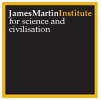Partner 1
|
James Martin Institute for Science and Civilization,
Website: www.martininstitute.ox.ac.uk |

|
The James Martin Institute (JMI) was formed in 2004 to identify and research science and technological issues critical in shaping the future of world civilization in the course of the twenty-first century. It will influence the course of technological and social change through the engagement of highest quality scholarship with key decision-makers in business, government and civil society. It is pursuing this agenda through building alliances of complementary groups across its own university and across the world. The Institute is based in the Saïd Business School and is also part of the University’s Twenty-First Century School.
Science, technology and inequality is one of the Institute’s key themes and just as the contribution of ResIST will help to establish the core of this theme, equally the Institute’s commitment to this line of work will help ensure that ResIST will have a strong legacy.
| Steve Rayner is James Martin Professor of Science and Civilization at the Said Business School and Director of the James Martin Institute. He took a BA Philosophy and Theology, University of Kent at Canterbury in 1974 and PhD Anthropology, University College London, 1979. He brings to the project the skills and experience of a distinguished international researcher on risk management, global change and sustainable development with a strong record of contributions as a public intellectual to policy and management debate. |

|
He will collaborate closely with Peter Healey in the task of intellectual management of the project as whole and will help in the task of developing the framework on structural, representational and distributional inequalities in S&T capacity building under WP0.
| Peter Healeyis a Research Fellow at the James Martin Institute and the ResIST coordinator. He brings to the team research management experience in national and international projects, most recently as coordinator of European Thematic Network STAGE (Science, Technology and Governance in Europe) – eight country thematic network funded under the European Commission’s Fifth Framework Programme. |

|
Peter’s role is to:
- manage the ResIST project, including being responsible for periodic reports to the European Commission and for synthesis of the contributions to the final report;
- act as co team leader with Lídia Brito for WP0 taking significant responsibility for task (a) under that work package - building the conceptual framework - and lead responsibility for tasks (b) and (c);
- make significant contributions to WP3, particularly in the development of the initial framework document, decisions on the cases of innovative approaches to the remediation of inequalities which this document will frame, and in the study and write-up of the case studies themselves;
- participate strongly in the other work packages, largely through workshops and similar activity, as a basis for his role in synthesis and write up, and as a base for his other management responsibilities.
| Steve Woolgar is a Sociologist who holds the Chair of Marketing at theSaïd Business School, University of Oxford. He was formerly Professor of Sociology, Head of the Department of Human Sciences and Director of CRICT (Centre for Research into Innovation, Culture and Technology) at Brunel University. He took his BA (First Class Honours), MA and PhD from Emmanuel College, Cambridge University. He has since held Visiting Appointments at McGill University (Sociology '79-81), MIT (Program in Science Technology and Society, '83-84), Ecole Nationale Superieure des Mines, Paris (Centre de Sociologie de l’Innovation, '88-89) and UC San Diego (Sociology, '95-96). |

|
He is the winner of a Fulbright Scholarship, a Fulbright Senior Scholarship, and an ESRC Senior Research Fellowship. From 1997-2002 he was Director of the ESRC Programme Virtual Society? - the social science of electronic technologies a £3½m venture comprising 22 research projects throughout the UK.
Steve is a work package leader for Work Package 3, with João Nunes. He is closely involved in the study looking at accountability issues raised by mundane technologies in Work Package 3, and will advise on the strategies for engagement with policy and practice under Work Package 0, and the key narratives which will structure the final report.
| Daniel Neyland is Senior Research Fellow at Said Business School, and Senior Research Associate of Green College, University of Oxford. He took his first degree (Social and Political Sciences) at Trinity Hall, Cambridge University in 1996, and his PhD on the social dynamics of surveillance systems from CRICT, Brunel University in 2000. Since then he has conducted research on accountability, regulation, governance, strategy and privacy. |

|
Dan’s contribution to ResIST consists of full-time research commitment for 21 months, beginning in month 4 of the project and completing in month 25. This time will be spent researching and articulating new accountability systems and issues of inequality as established under Work Package 3. This will involve three principal tasks. First, in conjunction with the work-package leaders, he will contribute to the production and analysis (and possible later revision) of a framework for evaluating innovative approaches to accountability. Second, he will produce a three-part, comparative, case-study based analysis of accountability issues in relation to mundane and pervasive technologies. This will focus on textile lifecycles, vaccines and e-waste (again as specified under Work Package 3). Third, he will work closely with other members of the work-package team (who are focusing on approaches to the remediation of inequalities and to capacity building) in drawing together and producing collaborative reports on the findings of these studies. Beyond these work-package specific tasks he will contribute to the broader development of ResIST by taking a full part in meetings, discussions, outreach events and publications.
| Jerome Ravetz is an Associate Fellow at the James Martin Institute. He is a philosopher who has made insightful contributions to our understanding of science as an intellectual and social phenomenon, in particular when the facts surrounding science are uncertain and the values in dispute. Recently he has reviewed European projects in the field of 'science, society and governance' extending back over the last ten years. Jerry will play the role of critical friend to the ResIST project and adviser to the management group. |

|